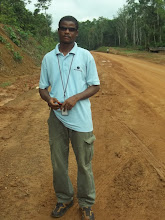
‘Gboyo Center’ Lies In Ruins
The most upper point of Harper City known as Up Cape looks like Benson Street in Monrovia where the Masonic building is situated.
Like the Masonic building on Benson Street, there is a four storey building with the inscription on the top front view, ‘Morning Star Lodge N0 6’. The ‘Morning Star Lodge N0 6’ is also popularly known as the Harper Masonic Temple or ‘Gboyo Center’ which was reportedly used as meeting hall for individuals who were believed to be involved in ritualistic activities in the county.
‘Gboyo’ is a word used in Liberia, especially in the Southeast to refer to ritualistic killing.
The ‘Gboyo center’ that once caused terror amongst residents of Harper, especially those in neighboring communities who fell prey to ritualistic activities in the area, is correctly laying in ruins.
A permanent citizen of Harper City told The NEWS recently that the building and its entire vicinity remained a terrible and a ‘no-go zone’ until the civil war when it was allegedly looted and vandalized by rebel forces.
“People in this entire community used to be forced to go to bed as early as 6:00 pm; and no one was even brave to pass along this road or street after 5:00…because that person will not live to tell the story,” he said.
In other parts of Liberia, ritualistic activities have been mainly associated with ‘state power’ or search for job.
But for Maryland County, gboyo or ritualistic activity has been an age-old characteristic of the county.
Unlike other places in Liberia, gboyo activities have been and continued to be a common practice in Maryland which can not be associated with search for job or elective post.
The practice, according to some citizens of the county, was fast becoming a normal pattern of life among the people to the extent that those who were connected with the practice could not hide their connection and was seen as an act carried out by the elites.
A brief about Maryland County and gboyo activities (source: Sunday Express published in October 1977)
The first trial of the ‘gang of 12’ persons indicted for gboyo activities started in Harper, Maryland County on September 12, 1977.
A few days later, two of the defendants, Joshua Brown and Teah Toby, were set free and later testified as state witnesses.
During the trial, one of the defendants, Francis Nyepan told the court that he initially confessed to the killing of Moses Tweh at gun point and under cruel treatment from the Maryland County police, who, he said, arrested and mishandled him.
“…I was dragged, and given electric shocks on the tender parts of my body, and was made to cut grass with my fingers and later placed on ice when the agents put me on a drum of water with blocks of ice.”
Nyepan further alleged that he was arrested and charged with the killing of Moses Tweh as a result of a traditional juju ordeal that had been ordered by the then acting Superintendent of Maryland County, Nathan Barnes.
Other defendants also complained of being maltreated, humiliated, tortured and said their earlier confessions were given and extorted under severe torture.
Some police officers also testified that James Anderson had obstructed police investigation of the disappearance of Moses Tweh.
During the process, the Superintendent ordered the release of two of the accused, Wonplu Boye and Kotie Weah who were apprehended by the police as suspects in the Tweh’s disappearance.
The two were released on July 3, the same day of the night Moses Tweh, who had gone missing was killed.
State witness, Joshua Brown testified that: “When I got in the yard (of Allen Yancy), I saw old pa Barclay and Kotie Weah who both came to the jeep and when Nyepan opened the jeep, Wonplu Boye and Barclay held Moses Tweh by the hands and walked him to the lime tree in the backyard of Yancy. There Barclay and Weah spread a dark flexible material on the ground and sat Moses Tweh on it.
The witness further said: “At this time a circle was made around Tweh under the lime tree and Kotie Weah came out from the circle and stood over Moses Tweh. Then Wonplu Boye standing before Tweh remarked to him in the Kru dialect saying: You remember sometimes ago, you insulted me before the public and I told you that I was going to catch you, now, this is my time. As soon as Boye finished, Kotie Weah took an axe and hit Moses Tweh behind his neck twice and while on the ground, he (Weah) held him (Tweh) by the shoulder, pulled down Tweh’s short black pants and….”
The defendants were found guilty by jurors on October 26, 1977 and were sentenced to death by hanging.
The second trial of another eight defendants started on May 8, 1978 in Harper, which sew the death of one of the defendants before the end of the trial.
One month later, on June 9, the jurors announced a guilty verdict against defendants Allen Yancy, James Anderson, Francis Nyepan, Philip Seton, Wreh Taryonnoh, Putu Dweh and Thomas Barclay and were also sentenced to death by hanging.
Six months later (December 1978), the Chief Justice of Liberia James A.A. Pierre in a 60-page opinion upheld the verdict and affirmed the death sentence.
President William R. Tolbert later signed the death warrant of the seven defendants and they were executed by hanging.
Writes, Sam Zota, Jr., (May 30, 2011)

No comments:
Post a Comment